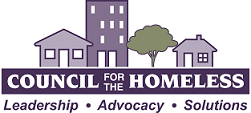 What does it mean to be chronically homeless?
What does it mean to be chronically homeless?
According to the National Alliance to End Homelessness, chronic homelessness is defined as long-term or repeated homelessness, often coupled with a disability. People who are chronically homeless are among the most vulnerable people in the homeless population. They tend to have high rates of behavioral health problems, including severe mental illness and substance abuse disorders, conditions that may be exacerbated by physical illness, injury or trauma. Consequently, they are frequent users of emergency services, crisis response, and public safety systems.
 What is Housing First?
What is Housing First?
Stable housing is an essential part of a chronically homeless person’s recovery. Housing First is a holistic solution to chronic homelessness that does not place conditions on access to housing and has been shown to be effective in communities nationwide. With Housing First, individuals who are chronically homeless are placed in safe and stable housing in tandem with supportive services that together foster long-term stability.
The key principles of housing first:
- Homelessness is first and foremost a housing problem and should be treated as such.
- Housing is a right to which all are entitled and it is not a reward for clinical success or compliance.
- People who are homeless or on the verge of homelessness should be returned to or stabilized in permanent housing as quickly as possible and connected to resources necessary to sustain that housing.
- Issues that may have contributed to a household’s homelessness can best be addressed once they are housed.
 Housing First – Local efforts
Housing First – Local efforts
Locally, our community is addressing chronic homelessness with the Lincoln Place project in Vancouver and other apartment units around the county. The first of its kind in our community, Lincoln Place was developed by the Vancouver Housing Authority as a 30-unit permanent supportive housing project based on the Housing First approach. See the Lincoln Place Information Sheet and the Lincoln Place FAQ for more details.
Local news coverage in The Columbian:
Lincoln Place gives chronically homeless a home, February 4, 2016
The opening and dedication of Lincoln Place – Cantwell, Murray tout Lincoln Place, February 17, 2016
 Housing First successes in other communities
Housing First successes in other communities
Utah – Since launching Housing First efforts in 2005, officials in Utah estimate a 74% reduction in the number of homeless people living on Utah’s streets. As reported by Utah Public Radio, Utah is on track to end chronic homelessness in their state.
Boston, MA – Friends of Boston’s Homeless Housing First program saves approximately $10,000 per participant per year in health and public safety costs and reports a 90% housing retention rate.
Hennepin County, MN – Hennepin County includes the cities of Minneapolis and Rogers. The Hennepin County Housing First Partnership program reports 91% of participants remained in housing for at least one year. Seventy-seven percent remained in permanent housing since the start of the project in 2006.
Nashville, TN – On Feb. 9, 60 Minutes aired a story called “100,000 Homes: Housing the homeless saves money?”The story highlights how community members are partnering to house the most vulnerable chronically homeless in Nashville. Click to view more information on the 100,000 Homes Campaign, which includes follow up coverage on the stories shared in the 60 Minutes segment.

